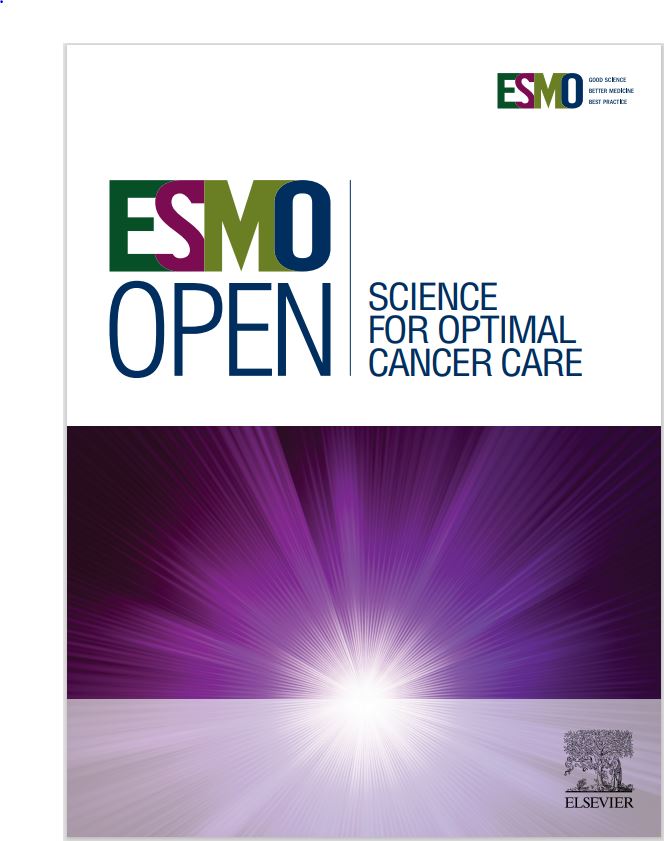Expression of antibody–drug conjugate targets in soft tissue sarcomas
IF 8.3
2区 医学
Q1 ONCOLOGY
引用次数: 0
Abstract
Background
Soft tissue sarcomas (STSs) are aggressive and heterogeneous tumors with few efficient systemic therapies. Antibody–drug conjugates (ADCs) represent an emerging therapeutic option in oncology. Their efficacy is dependent on the expression of the ADC target on tumor cells. Very few data are available on ADC target expression in STSs.
Materials and methods
We analyzed the mRNA expression of 62 targets and 60 genes potentially involved in resistance/response to ADC in 1664 clinical primary tumors, including 476 liposarcomas (LPSs) 341 leiomyosarcomas, 330 undifferentiated pleomorphic sarcomas, 286 gastrointestinal stromal tumors, 126 synovial sarcomas, and 105 myxofibrosarcomas. Tumor expression in each type was compared with expression in 7414 normal tissue samples. To confirm the results at the protein level, we applied immunohistochemistry (IHC) to four ADC targets in another series of STS samples.
Results
Expression profiles of ADC targets were heterogeneous across and within all STS types. All types expressed multiple ADC targets. An overexpression rate of at least 25% of samples in at least one type was observed for 41 targets. The high target overexpression rate in some STS types suggested numerous new therapeutic opportunities not currently studied in clinical trials, such as PTK7 overexpressed in 81% of LPSs. In addition, co-expression of ADC-target pairs and of targets with signatures of vulnerability to immune checkpoint inhibitors, poly (ADP-ribose) polymerase (PARP) inhibitors, and cyclin-dependent kinase (CDK)4/6 inhibitors was evidenced in the different pathological types, suggesting opportunities for testing ADC-based combinations. Finally, we showed heterogeneous expression profiles of potential ADC resistance/response genes between and within STS types. IHC confirmed the mRNA results for the four tested targets.
Conclusion
STSs express multiple target genes relevant for ADC treatment and expression varies between and within the pathological types. This comprehensive ADC target landscape, based on the largest molecular epidemiology study in STS, should help clinicians and drug developers for further evaluation of ADCs across STS types.
抗体-药物偶联靶点在软组织肉瘤中的表达
背景:软组织肉瘤(STSs)是侵袭性和异质性的肿瘤,缺乏有效的全身治疗方法。抗体-药物偶联物(adc)是肿瘤学中一种新兴的治疗选择。它们的疗效取决于ADC靶点在肿瘤细胞上的表达。关于STSs中ADC靶点表达的数据很少。材料和方法我们分析了1664例临床原发性肿瘤中可能参与ADC耐药/应答的62个靶点和60个基因的mRNA表达,包括476例脂肪肉瘤(lps)、341例平滑肌肉瘤、330例未分化多形性肉瘤、286例胃肠道间质瘤、126例滑膜肉瘤和105例黏液纤维肉瘤。将每种类型的肿瘤表达与7414个正常组织样本的表达进行比较。为了在蛋白水平上证实结果,我们对另一系列STS样本中的4个ADC靶点进行了免疫组织化学(IHC)检测。结果ADC靶点的表达谱在所有STS类型之间和内部均存在差异。所有类型均表达多个ADC靶点。在41个靶标中观察到至少一种类型中至少25%的样品过表达率。一些STS类型的高靶点过表达率提示了许多目前尚未在临床试验中研究的新的治疗机会,例如PTK7在81%的lps中过表达。此外,adc靶标对和具有免疫检查点抑制剂、聚(adp核糖)聚合酶(PARP)抑制剂和细胞周期蛋白依赖性激酶(CDK)4/6抑制剂易感特征的靶标在不同病理类型中被证实共同表达,这表明有机会测试基于adc的组合。最后,我们展示了潜在ADC耐药/应答基因在STS类型之间和内部的异质表达谱。免疫组化证实了四个检测目标的mRNA结果。结论stss表达多种与ADC治疗相关的靶基因,其表达在不同病理类型和不同病理类型之间存在差异。基于STS中最大规模的分子流行病学研究,这一全面的ADC靶点景观将有助于临床医生和药物开发人员进一步评估各种STS类型的ADC。
本文章由计算机程序翻译,如有差异,请以英文原文为准。
求助全文
约1分钟内获得全文
求助全文
来源期刊

ESMO Open
Medicine-Oncology
CiteScore
11.70
自引率
2.70%
发文量
255
审稿时长
10 weeks
期刊介绍:
ESMO Open is the online-only, open access journal of the European Society for Medical Oncology (ESMO). It is a peer-reviewed publication dedicated to sharing high-quality medical research and educational materials from various fields of oncology. The journal specifically focuses on showcasing innovative clinical and translational cancer research.
ESMO Open aims to publish a wide range of research articles covering all aspects of oncology, including experimental studies, translational research, diagnostic advancements, and therapeutic approaches. The content of the journal includes original research articles, insightful reviews, thought-provoking editorials, and correspondence. Moreover, the journal warmly welcomes the submission of phase I trials and meta-analyses. It also showcases reviews from significant ESMO conferences and meetings, as well as publishes important position statements on behalf of ESMO.
Overall, ESMO Open offers a platform for scientists, clinicians, and researchers in the field of oncology to share their valuable insights and contribute to advancing the understanding and treatment of cancer. The journal serves as a source of up-to-date information and fosters collaboration within the oncology community.
 求助内容:
求助内容: 应助结果提醒方式:
应助结果提醒方式:


